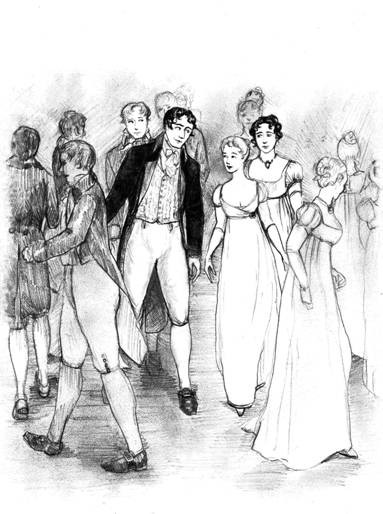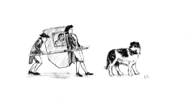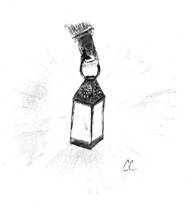There Must Be Murder (3 page)
Read There Must Be Murder Online
Authors: Margaret C. Sullivan
Tags: #jane austen, #northanger abbey, #austen sequel, #girlebooks

Spoilt by Great Acquaintance
“How do you do, General Tilney?” said Catherine
in a voice that was more composed than she felt.
The general’s answer held the barest hint of
civility. “Very well, I thank you.”
“I am glad to hear it. I am glad that you are
not in Bath for your health, sir.”
Lord Whiting made a noise that sounded
suspiciously like a laugh smothered with a cough.
“Ma’am,” the general said to a woman dressed in
half-mourning who was seated next to him, “May I present Mrs.
Tilney?”
“So this is the paragon that has captured dear
Henry!” the woman cried. “Why, she is adorable! So very
young!
”
“Lady Beauclerk,” the general informed
Catherine, “is a neighbor and a very old friend of the Tilney
family.”
“We so longed to see you when you were staying
at Northanger Abbey last year,” said Lady Beauclerk, fixing
Catherine with her bright eye. “But we were in mourning then for
dear Sir Arthur and not paying calls. But oh, did I wonder about
this Miss Morland who had at last conquered Henry Tilney! The
neighborhood had quite despaired of either of the Tilney boys
finding women good enough to suit their fine taste. I confess I
nurtured a hope that dear Henry might take pity on my Judith and
offer for her. My love,” she called to a young woman who had just
stepped off the dance floor, “come here and be presented to Mrs.
Tilney. I must present you to her, though she is so much younger
than you, for she is a married lady, and you are not.”
Miss Beauclerk was fair and delicate, ethereally
pale; one of those graceful, fluttering creatures who make an
ordinary mortal, even one in a new gown of the most delicate
muslin, feel like a plodding beast. Catherine, confused by Lady
Beauclerk’s speech and disconcerted at meeting this lovely woman
who apparently had once been a rival for her husband’s hand, could
do nothing but curtsy. As she rose, she felt a hand under her
elbow, and knew with a triumphant certainty that Henry stood beside
her.
“We were unprepared to meet so many old friends,
sir,” Henry said to his father, “but I am happy to perform the
introductions for my wife.”
“As you choose,” said the general with every
appearance of fashionable boredom.
“I hope you will not forget to introduce me,
Tilney,” said a young exquisite standing behind Lady Beauclerk’s
chair.
Henry’s hand tightened on Catherine’s elbow
momentarily. “With the greatest pleasure. My sweet, may I present
Sir Philip Beauclerk?”
“Your servant, Mrs. Tilney,” said Sir Philip. He
held out his hand, and Catherine, unsure what else to do, gave him
hers; in a single, graceful movement, Sir Philip bowed and raised
her hand to his lips.
“Henry dear, you are remiss in explaining family
history to dear Mrs. Tilney,” said Lady Beauclerk. “Philip is my
late husband’s nephew and heir, and has put us out of our
home.”
“You will give Mrs. Tilney the idea that I am
the world’s greatest scoundrel, ma’am,” said Sir Philip. “I was
happy to have you and Judith stay on at Beaumont, and am still, but
you would remove to the Dower House.”
“I dare say Mrs. Tilney understands that if I
had only myself to consider, I should have been very happy to stay
and act as your hostess, but it would have been most improper for
Judith to live with her unmarried cousin.”
“As you say, ma’am,” said Sir Philip with
another graceful bow.
“If only you had taken Judith off my hands years
ago, Henry! The least you can do is dance with her.”
Well and truly caught, there was nothing else
for Henry to do but request Miss Beauclerk’s hand in the set that
was forming, and nothing for Miss Beauclerk to do but accept, which
she did as gracefully as she did everything. With another squeeze
of the elbow and a significant, apologetic look, Henry was
gone—gone to the dance floor, with another woman on his arm—and
such a lovely woman!

Lord Whiting also gave Catherine an apologetic
look, but she understood it would not have done to stand up again
with him so soon; instead he took Eleanor to the other set forming.
Catherine was left alone, with such feelings of discomfort as can
be imagined: the general set to ignore her, Lady Beauclerk set to
tease her, and Henry gone; but a rescuer was at hand.
Sir Philip stepped close to her, his voice a
murmur for her ear only. “As my aunt has left you bereft of your
partner,” he said, “perhaps you will accept me as a substitute,
however inferior.”
Catherine accepted, all gratitude for such
kindness. She hoped to follow her brother-in-law’s example and join
the other set, but as they passed behind Miss Beauclerk, she
reached out to touch Catherine’s arm. “Mrs. Tilney, will you stand
next to me? Pray pay no attention to my mother’s rattle. Henry—Mr.
Tilney and I have been friends for a long time, and I am very happy
for you both.”
Catherine looked at Henry, who nodded and
smiled; thus assured, she took the place to which she had been
invited.
Sir Philip turned out to be the sort of partner
in whom Catherine normally delighted: a graceful dancer who did
nothing to draw undue attention to himself, scrupulously polite,
certainly handsome; but instead of giving her attention to her
partner, she found herself watching Henry dance with Miss
Beauclerk, watching him lean close to say something that made her
laugh. Common sense told her that in such a crowded room, Henry had
to lean close to be heard, but she could not be comfortable.
Sir Philip did not seek to engage her in
conversation beyond the commonplace civilities of a ballroom, for
which Catherine was grateful, though she felt she should be making
more of an effort. She felt it even more acutely after their two
dances were over, and Mr. King presented gentleman after gentleman
who wished introductions to the pretty young bride who had been
singled out by a man of fashion such as Beauclerk. Catherine danced
with them all, and conversed politely with them all, and was
obliged to speak very severely to one of them, who appeared to be
in liquor and seized her waist with more familiarity than allowed
by a country-dance. Mr. King hustled the offender away directly
with profuse apologies; Catherine heard the man say to the master
of the ceremonies, “But she was dancin’ with Beauclerk!” She could
not begin to understand him.
She had made up her mind to not dance any more
that evening, when Henry appeared before her like a miracle. “I
hope you saved two dances for me,” he said.
“Any two you wish.”
“The next two, then.”
Her flagging spirits revived, they had their two
dances, and then everyone was going in to tea. Though the room was
crowded, Henry managed to find a table, and sent a waiter to fetch
their tea.
“How delightful that we were dancing together
just now,” said Catherine. “I would not have liked to be obliged to
drink tea with someone else just because he happened to be my
partner for the last dance.”
“Nor I, my sweet; and that is why I gave Mr.
King a half-crown to tell me which would be the last dance before
tea.”
Catherine gasped, and then laughed, and poured
her beloved a cup of tea as they were joined by Lord and Lady
Whiting.
“Oh, how very comfortable,” said Eleanor. “Here
we all are together, when we despaired of finding a place!”
“The General will not join us?” asked Henry.
“The General,” said Whiting, “waits upon Lady
Beauclerk’s party, of course.”
Catherine let out a sigh of relief and smiled at
Henry.
“Now that we can speak more freely, I may ask:
what brings you all to Bath?” Henry asked, passing a cup of tea to
his sister.
“I wrote to you that we were visiting at the
Abbey over Christmas,” said Eleanor. “My father pressed me to stay
on after the holiday to act as his hostess.”
“What my lovely wife has left out of the story,”
said his lordship, “is that General Tilney needed a hostess at the
Abbey so that he could continue to receive Lady Beauclerk and her
daughter, who have been frequent callers at the Abbey, at least on
the days that the general was not haunting Beaumont.”
“Indeed?” asked Henry, exchanging a speaking
glance with his sister, who bowed her head and sipped her tea. “But
you have not yet answered my question: what brings you all to
Bath?”
His lordship smirked. “Her ladyship thought the
waters might do her good, and the general decided soon after that
the waters would do
him
good.”
“John,” said Eleanor in a warning tone.
“Do not look so despondent, my love,” said his
lordship. “If the general marries Lady Beauclerk, he will no longer
be able to exploit your very proper daughterly scruples to keep you
at the Abbey for months on end. He will have a hostess permanently
installed.”
Eleanor shook her head. “I cannot like it. It is
not seemly, so soon after Sir Arthur’s death.”
“You refine too much upon trifles, my love. You
may be sure that the neighborhood had them married off before Sir
Arthur was cold in his grave. ‘So suitable!’ the old biddies cry.
‘Such old friends! Such fine fortunes!’”
“I know
you
cannot like it, Henry,” said
Eleanor.
“It is none of my affair, I am sure,” said
Henry. “My mother has been dead these ten years. It is not
wonderful that the general should seek a wife.”
“I would have had him look elsewhere.”
“Do we have the right to dictate to him,
Eleanor, when we did not allow him to dictate to us?” said Henry,
with a smile at Catherine.
“But John and Catherine are not—” Eleanor bit
off the words.
“Hateful shrews?” supplied her husband.
Even Eleanor laughed at his sally.
“I would not worry overmuch,” said his lordship,
finishing his tea. “I am not so sure that her ladyship will accept
an offer from General Tilney. She is enjoying single blessedness
too much to give it up very soon. Do you know what they call her?
The Merry Widow.”
“Do they indeed?” murmured Henry.
Catherine did not expect much enjoyment from the
remainder of the evening, but more dances with the viscount, and
Sir Philip, and especially with Henry, brought back all the
happiness with which she had anticipated this visit to Bath,
alloyed only by Miss Beauclerk taking Catherine’s hand at the close
of the ball and begging her to call at their house in Laura-place
on the morrow. Her manner was so perfectly frank and friendly that
Catherine could not refuse, though she shrank from a more intimate
acquaintance.

Matthew and MacGuffin waited for them outside
the rooms; Matthew had already procured a chair for Catherine, but
Henry walked ahead of the chair, deep in conversation with Matthew,
who held a lantern to light the way. The chair-men kept a careful
distance, unsure what to make of the very large Newfoundland dog,
so their progress was slower than usual.

